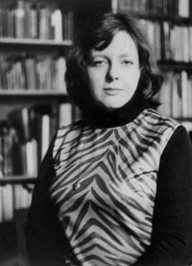“Brigid Brophy … in Transition”:
Co-Editors: Professor Richard Canning and Visiting Professor Gerri Kimber, University of Northampton, England
In 2015, I and the ECW team at the University of Northampton ran a two-day international conference to celebrate all aspects of Brigid Brophy’s literary career, as well as her leading contributions to animal rights, vegetarianism, anti-vivisectionism, humanism, feminism and her advocacy of the Public Lending Right.
Brophy (1929-1995) wrote books of all kinds in all genres. The 600-page monograph Prancing Novelist: A Defence of Fiction in the Form of a Critical Biography in Praise of Ronald Firbank (1973) may have created a genre. Her fiction career began with the short-story volume The Crown Princess (1953), followed by seven novels, each entirely unlike its predecessors. Hackenfeller’s Ape (1953) concerned the relationship between an ape at London Zoo and a Professor observing the animal’s mating rituals. The King of a Rainy Country (1956) depicted a set of Bohemians in post-war London and Venice. Flesh (1962) portrayed the erotic tutelage of an inexperienced husband by his wife.
The Finishing Touch (1963, revised 1987), set in a girls’ finishing school in the South of France, offered a fully-realised homage towards Ronald Firbank. It also saw art historian and Soviet spy Anthony Blunt portrayed in fictional guise as the Headmistress. The novel out-Brodied Miss Jean Brodie, responding creatively to Muriel Spark’s 1961 novel. The Snow Ball (1964) reflected Brophy’s devotion to Mozart, its protagonists attending a ball dressed as characters from Don Giovanni with dramatic consequences. In Transit (1969) remains one of a handful of English novels to conceal entirely the anatomical sex of its chief protagonist, with the further, rare distinction of being set in an airport departure lounge. The Adventures of God in His Search for the Black Girl (1973) punned on George Bernard Shaw’s 1932 parable about religious faith. Palace without Chairs (1978), Brophy’s last novel, a playful dialogue questioning the nature of democracy, was also inspired by Shaw.
Brophy’s radio play The Waste Disposal Unit was broadcast and published in 1964. The Burglar (1967), her only published stage play, had a West End run starring Jim Dale and Sian Phillips, directed by Frank Dunlop. Pussy Owl: Superbeast (1976) was Brophy’s sole work of children’s fiction. Non-fiction writings include Black Ship to Hell (1962), a psychoanalytic account of man’s destructive and self-destructive temperament, Mozart the Dramatist (1964; revised 1990), Black and White: a Portrait of Aubrey Beardsley (1968) and also Beardsley and His World (1976), the aforementioned Prancing Novelist (1973), a work of children’s non-fiction with illustrations entitled The Prince and the Wild Geese (1982), the collections Don’t Never Forget (1966), Baroque ‘n’ Roll (1987) and Reads (1989), and the iconoclastic and controversial Fifty Works of Literature We Could Do Without (1967), for which Brophy collaborated with Michael Levey and Charles Osborne.
On the fiftieth anniversary of the publication of In Transit, the first edited book collection concerning Brophy will appear. Entitled Brigid Brophy in Transition, it embraces her lives and writings in all their diversity, originality and achievement.
Proposal:
- promiscuous and versatile concerning length and form
- send what you want, not what you think the editor(s) want(s)
- perhaps 10k as an upper limit (but do try to break the rules)
- short stuff too (haiku is probably minimum length)
- MLA latest style for academic contributions preferred, but open to other forms of presentation for other contributions
- creative responses longed for, including poems, paw prints, stories, drama, reminiscence, invention, polemic, journalism, photographs, art, T-shirts
- contributions from all conference participants welcome, whether they feature in the forthcoming CWW special issue on BB or not – do write something else!
- non-academics, lay scholars, enthusiasts, PhD students and readers welcome
- feel free to write about women, men, uncertain, changeable or “other” – or any combination of these [non-] “species”
- feel free to self-describe as male, female or any preferred designation
Proposed Contributors include:
- Richard Canning, on Brophy’s Firbank and Decoding The Princess Zoubaroff
- Gary Francione and other canines, on Brophy’s theory of animal rights
- Gerri Kimber, on Brophy’s Katherine Mansfield and her Colette
- Kate Levey, Brophy’s daughter
- Jill Longmate, t.b.c.
- Robert Mackay, t.b.c.
- Peter Parker, on Brophy’s Firbank, Prancing Novelist and non-fictional method
- Sam Reese, on Brophy’s 1950s short stories and early novels
- Kim Stallwood, “A Felicitous Day for Fish”
- Carole Sweeney, t.b.c.
Proposed publication: November 2019
Proposed final submission date: October 2018
Proposed publisher: range of US/UK University Presses approached, once abstracts confirmed
Proposed remuneration: at least 2 copies, more and/or a fee if resources allow
Reminder: the UK REF criteria (for English and all other areas) does not discriminate on grounds of place or form of publication
Abstracts, 100-300 words, by January 31st, 2018, with ‘Brophy’ in the subject line to: richard.canning@northampton.ac.uk


